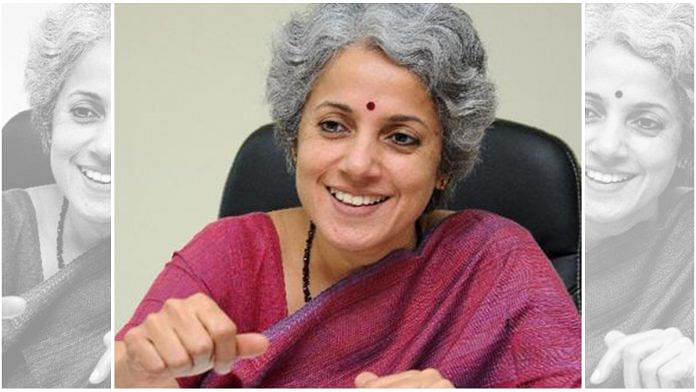New Delhi: Soumya Swaminathan, chief scientist at the World Health Organization (WHO), has said she has learnt some key lessons from the Covid pandemic and most important among them are the significance of the role of science and investing in public and primary healthcare.
In an article in The Hindu, Swaminathan wrote that “countries that invested in primary healthcare over the past decade or two are reaping the benefits now”, reiterating what she had said at the JRD Tata Oration last week, which was hosted by the Population Foundation of India on its 50th anniversary.
She also said India should now move towards electronic and portable health records, and better manage “infodemic” as false information leads to “mistrust in governments and the public health response”.
Swaminathan broke down her address into two sections — lessons learnt from the pandemic and what must be done now so we are better equipped for similar situations in the future.
Impact of Covid-19 on healthcare systems
During the early months of the pandemic, many hospitals had shut down their other services to manage the number of Covid-19 patients. Due to this, 70 per cent countries faced a “partial or complete disruption of immunisation services”, she said.
This also led to a drop in diagnosis and treatment of non-communicable diseases, family planning, malaria and TB case detection and urgent blood transfusions.
Swaminathan said this had also shed light on the fissures in health insurance and financial protection systems. With 800 million people across the world spending more than 10 per cent of their “household budget” on healthcare that leads around 100 million into extreme poverty each year, financial protection and effective heath coverage are the need of the hour.
Stating that many countries do not have the data systems to be able to accurately measure both mortality and the incidence of certain diseases, Swaminathan said India too “needs to invest more in its vital registration system” .
Also read: Fair distribution, allocation of Covid vaccine a big challenge, says WHO chief scientist
Need for improved access to contraceptive services
Swaminathan underlined the progress that India has made in reducing maternal and infant mortality, and increasing institutional births, but also stressed on the need for family planning, improved access to contraceptive services and safe abortions. An absence of uterotonics (agent used to induce labor), antibiotics and clean birth environments could lead to a 60 per cent increase in maternal deaths, she said.
Swaminathan spoke about the surge in domestic violence cases during the nationwide lockdown and said only 1 per cent of women in India sought help from the police. She sought the inclusion of a response to violence against women “in the package of essential services”. The WHO member states were also urged to do the same.
The number of women and girls living in extreme poverty in India is set to hit 100 million, she said. Swaminathan also underlined the lack of available data “that is disaggregated by sex and age”, with more women than men working in the informal sector and a 60 per cent drop in income during the first month of the pandemic.
Also read: Covid-19 a perfect storm with end nowhere in sight, says top expert and Trump adviser Fauci
What needs to be done now
With social distancing becoming the new normal now, telemedicine is picking up. India has already created a road map toward it with the National Digital Health Blueprint, Swaminathan pointed out.
“It is important to think about not only data governance principles, but also new ways of collecting, using and sharing data, enabling local, contextualised decision-making,” she wrote.
The private sector has been on the rise in the field of technology, and Swaminathan cited the example of Aravind Eye Hospital in Puducherry that experimented with shared medical appointments. It has resulted in “better health outcomes as well as higher productivity, apart from reducing costs and saving a lot of time for doctors”, she said.
During the Covid-induced lockdown, Swaminathan said, it was of utmost importance to “integrate social protection systems, food systems and health systems” in order to really have an impact on nutrition in India. The country needs to expand these to protect its most vulnerable population groups. India ranks 102nd on a list of 117 qualifying countries on the Global Hunger Index 2019.
When the pandemic had just hit India, healthcare workers faced a shortage of PPE kits and masks. Once that was tackled, delayed salaries and long hours became a point of contention. The pandemic has also claimed lives of healthcare workers.
Swaminathan stressed on the need to protect healthcare workers by making sure they have “the tools they need, receive regular training and mentoring, and are well paid”.
She also touched upon the issue of false or misleading information, which she said leads to “harmful behaviours, and mistrust in governments and the public health response”.
“In the last eight months we have done an incredible amount of work with many tech companies. But infodemic management is not straightforward; it is linked to people’s beliefs and behaviour,” Swaminathan wrote, adding that a behavioural insights group has been set up to provide advice on behaviour change.
Underlining the need for “strong institutional mechanisms”, thee WHO chief scientist argued for health literacy to tackle stigma and discrimination in India. She also said India was on the “path to investing in Universal Health Coverage”.
A health system, she added, has to involve the people it is trying to serve and have them involved in developing the services. It cannot solely be supported by financial investments, she said.
Also read: World’s largest museum teams up with WHO to help kids make their own Covid action plan



